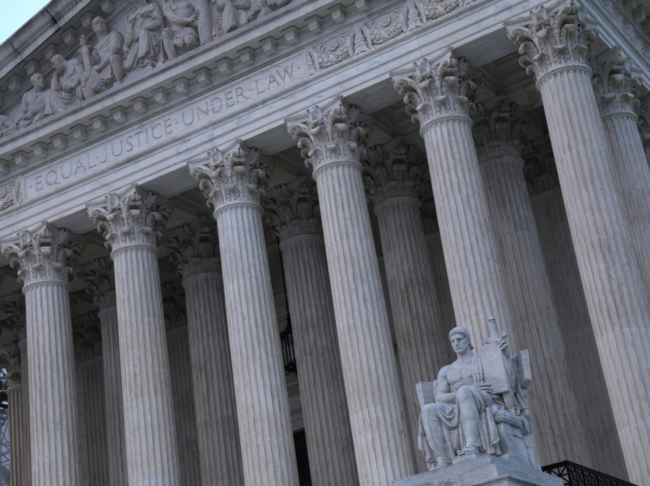On June 29, the Supreme Court issued a ruling on two cases relating to affirmative action, holding that race-based affirmative action programs in college admissions processes violate the Equal Protection Clause under the Fourteenth Amendment. The cases – Students for Fair Admissions, Inc. (SFAI) v. President and Fellows of Harvard and SFAI v. University of North Carolina – will undoubtedly affect future demographics of diversity in colleges and universities across the country in the following years.
The concept of affirmative action has existed since the early twentieth century. However, affirmative action in name was first introduced in the 1960s as a means to promote equal opportunity, and the policy was mainly coined in order to reinforce the Civil Rights Act of 1964. On March 6, 1961, John F. Kennedy signed Executive Order 10925 requiring all federal contractors to take “affirmative action” in ensuring all job applicants, as well as employees, were treated equally regardless of race or ethnicity.
After Rev. Dr. Martin Luther King Jr. was assassinated in 1968, students began pushing even harder for colleges and universities to escalate their efforts in increasing representation in their institutions. This resulted in Harvard’s admissions rates of African Americans increasing by seventy-six percent the next year. After Harvard’s boost in Black enrollment, other prestigious universities began following suit.
Affirmative action, since its inception, has always been a quite controversial topic among the public. Some argue that affirmative action rightfully gives opportunity to people who have been stripped from access due to their identifiers, while others argue that giving some people more opportunity simultaneously strips others of such opportunity. This public feud is extremely visible in the recent Supreme Court Cases.
Chief Justice John Roberts, writing for the majority, declared that race-based college admissions are fundamentally unconstitutional, violating the Equal Protection Clause of the 14th Amendment, and, therefore, should be revoked. According to Roberts, a member of the court’s conservative wing, “racial classifications are simply too pernicious,” by which he meant that selectively granting admission based on racial criteria is particularly detrimental to the process itself.
However, Roberts did conclude that if race has affected one’s life or chances of being admitted into a university, then that may be taken into account in personal essays. He remarked, “nothing in this opinion should be construed as prohibiting universities from considering an applicant’s discussion of how race affected his or her life.” While Roberts opposes race-conscious college admissions, he supports transformative race-based experiences being a factor in the admissions process.
In both cases brought before the Supreme Court, the court’s liberal justices wrote scathing dissents, bringing up the historical impact of affirmative action and what its loss will mean for future educational opportunities. In her dissent from the UNC ruling, Kentanji Brown Jackson, the court’s newest and first Black female justice, wrote, “With let-them-eat-cake obliviousness, today, the majority pulls the ripcord and announces ‘colorblindness for all’ by legal fiat. But deeming race irrelevant in law does not make it so in life.” Jackson is referring to the years of segregation and inequality in America that have created an extensive divide in education between different races.
Jackson’s fellow justice and dissenter, Justice Sonia Sotomayor, the court’s first Latina justice, echoed a similar point in her dissenting opinion against the Harvard ruling: “Because a foundational pillar of slavery was the racist notion that Black people are a subordinate class with intellectual inferiority, Southern States sought to ensure slavery’s longevity by prohibiting the education of Black people, whether enslaved or free. Thus, from this Nation’s birth, the freedom to learn was neither colorblind nor equal.” As Sotomayor points out, there was an intentional divide from the beginning, and race-based affirmative action sought to bridge that gap by giving people of color opportunities that had been historically taken away from them. According to dissenters, the loss of race-based affirmative action will cause educational opportunities to become far more limited and unequal, setting back the nation as a whole.
In the wake of the Supreme Court’s decision, Director of College Counseling Jameel Freeman sent out a letter to the incoming seniors and their families on behalf of the college office, outlining the ruling’s immediate implications. “This will undoubtedly impact the demographic makeup of most colleges and universities in the United States,” he explained, “particularly as it relates to race and ethnicity.”
While recognizing the ruling’s inevitable negative consequences, Freeman was far more hesitant to make predictions about its immediate effect on the college admissions process, writing, “Truthfully, most colleges and universities do not have concrete answers right now.” Freeman stressed that undergraduate admissions are a “complex and (still) holistic process” and expressed confidence that colleges “will develop new strategies for achieving the proven educational, social, and psychological benefits of diversity.” He concluded his email by reminding students that the college office will always be open to help, advise, and support students in any way possible.
In a later conversation, Freeman emphasized that, regardless of the presence of affirmative action, he always encourages students to highlight the diversity of their backgrounds as they go through the college application process. “The Court stated that while race cannot be a determining factor for admission, colleges can still consider a student’s background and lived experiences,” he remarked. “Even if more colleges remove the ability to list one’s race or ethnicity, we want our students to embrace and celebrate who they are, and proudly highlight the wonderful diversity of their individual backgrounds.”
Freeman’s words serve as a reminder that, no matter how colleges choose to proceed in the absence of affirmative action, diversity will always hold a firm place in institutions across the country, and that we, as students, should always value and cherish the diversity of our identifiers.






